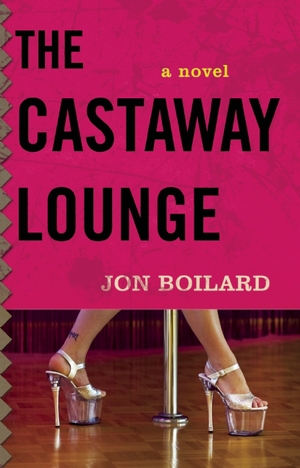Rachel Trezise casts a critical eye over Jon Boilard’s novel The Castaway Lounge from Dzanc Books.
Jon Boilard is the kind of writer who has eschewed convention in favour of authenticity. It’s safe to say, I think, that if the US have any kind of equivalent to Radio 4’s Book at Bedtime, they’re not going to pick The Castaway Lounge to feature on it. And Boilard would probably be horrified if they did. In other words, Jon is very much my kind of writer. An earlier reviewer warns that the reader might like to take a shower after finishing this novel, but it’s things like Downtown Abbey that tend to make me want to wash so I guess I’m absolutely the target audience and it’s no surprise I loved every page of the book.

Set in a down-at-heel Massachusetts mill town circa 1986, the main plot concerns Jackson ‘Applejack’ Woods, ex-bare-knuckle boxer and tough guy for hire, cocaine-peddler, womaniser and, as it happens, a big old softie, (he loves his German Shepherd), who needs to make some adjustments to his life since botching a job for his old boss, owner of the lap dancing club and title of the book, The Castaway Lounge. Routine service goes tits-up when a private party thrown in honour of local businessman ‘Selectman’ misfires, underage dancer Peanut slips over in the bathroom, and mutilated body parts start showing up all over town. You could call it a comedy of errors if you like your comedy painted obsidian-black. Running alongside the central narrative is a love story between Applejack and new blonde dancer on the block, Suzanne, famed around town for her appearance on Oprah Winfrey and claim to have been abducted by aliens. (Crop circles keep appearing in the cornfields out past the drive-in movie theatre). But this isn’t chocolate boxes and roses, as Jarvis Cocker might say; it’s dirtier than that. The kind of love story that features the romantic lead sleeping with the customers who buy his violence and having oft-repeated bust-ups with his recovering alcoholic ex-wife, while his sweetheart practices her moves at the titty club and fights off punters ridiculing her for her belief in little green men. But it is a love story nonetheless, casting splinters of light into the novel’s most tenebrous corners. At least they share a great adoration for Elvis Presley.
While Applejack’s off stage there are myriad walk-on characters available to entertain and disturb. They all seem to be on a similar edge to Jackson Woods, and they all have excellent names: Banana Nose, Two Beer Dick, Beverly Hills, Bloody Knuckles, Cemetery Cyn. Past-it whores and bag ladies, shifty small time entrepreneurs and affected ex-military, weaving through life the only way they know how; hustling and dancing and drinking. This way the novel projects a three dimensional map of the presumably fictional ‘Mill Town’. All that’s left out are the people who do endure on a regular paycheque, who never frequent strip clubs or bet on illegal brawls. A kind of hard-boiled Massachusetts ‘Under Milk Wood’. But things don’t fall quite so neatly back into place here as they do in cosy Llareggub once the cyclone’s blown through town. Boilard’s characters are rapacious, heading for sure death or glory while events twist towards inevitable calamity. People come, one by one, to all kinds of sticky ends, if they don’t try to off themselves first. One unfortunate feller ends up cut to bloody slivers in a wood chipper.
If any of this sounds gratuitous, believe me, it’s not. Many of the characters have themselves orchestrated their lives to run this way; they should know what’s coming. Plus Boilard’s writing is meticulously measured. As quickly as he can deliver you into a perilous situation he can smoothly snatch you out. Violence is everywhere and it’s brutal, but it’s quick. The novel’s structure and breakneck pace mean you never have to spend too long at the same bar room fracas, the same dingy exchange between prostitute and john, the same grim discovery of a sixteen-year old’s dismembered leg. But boy you’ll know you’ve been there and mainly because it was bone-dry, sinisterly comic. It’s interesting perhaps that Boilard’s next publication will be a collection of short stories, as this novel, while clearly a novel, features many other anecdotes lacing in and out of the main sequence. Like a literary pic ‘n’ mix, stories are continuously beginning and ending, characters continually revolving.
I read the book in a couple of sittings then spent a good week digesting its contents, Boilard’s clipped and assured prose making me snake-like in my consumption. As a resident of a busted-up former coal mining town I can vouch for the validity of the desperation of the characters. There’s no lap dancing club in the Rhondda but the habitués are here, no fear, bigger than life itself and ripe for fiction.
The Castaway Lounge is available from Dzanc Books.
Rachel Trezise is a novelist, essayist, playwright, and contributor to Wales Arts Review.
Jon Boilard photo © John Minihan











